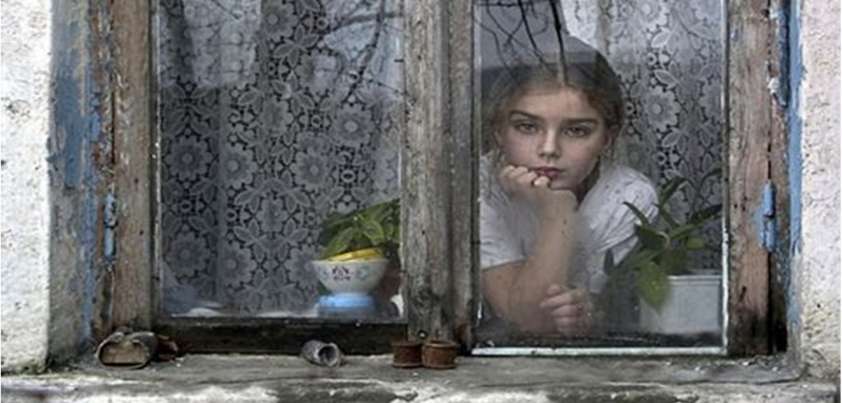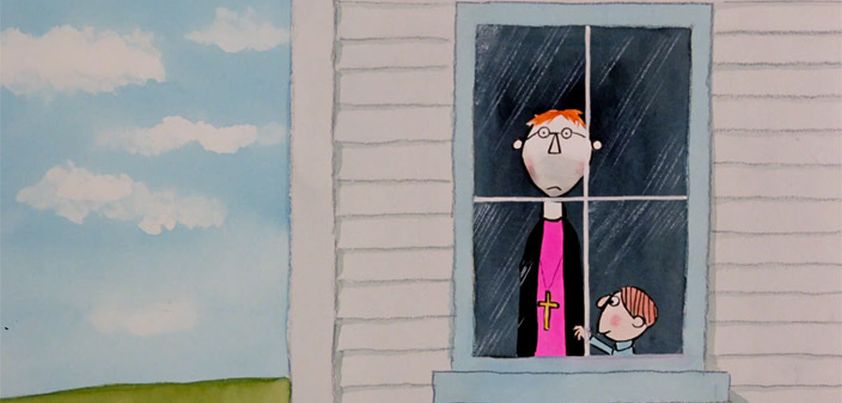 A major theme of James Joyce’s Eveline is gender roles in early 20th century Dublin (the limited life choices available to young women from working-class families of the time). Faced with no meaningful job opportunities, they were expected to act as unpaid family help until married. Children may then bring some joy, but the rest of their lives would consist of the same inescapable drudgery and potential abuse as at home. Other themes include duty, domestic abuse and exploitation, escape vs. uncertainty and fear, guilt, and paralysis (conditioned acceptance of her lot). More…
A major theme of James Joyce’s Eveline is gender roles in early 20th century Dublin (the limited life choices available to young women from working-class families of the time). Faced with no meaningful job opportunities, they were expected to act as unpaid family help until married. Children may then bring some joy, but the rest of their lives would consist of the same inescapable drudgery and potential abuse as at home. Other themes include duty, domestic abuse and exploitation, escape vs. uncertainty and fear, guilt, and paralysis (conditioned acceptance of her lot). More…
Poison
 Roald Dahl is best known for short stories that make their point using dark humor and have a surprise ending. This story exhibits neither of these features. The central theme is the racism that existed under British colonial rule. Dahl gets the message across through this allegory about the way a British businessman acted badly towards an Indian doctor who answered his call for help in the middle of the night and may well have saved his life. In the story we learn that there are several kinds of poison. Unlike the deadly krait, some of them kill quite slowly. More…
Roald Dahl is best known for short stories that make their point using dark humor and have a surprise ending. This story exhibits neither of these features. The central theme is the racism that existed under British colonial rule. Dahl gets the message across through this allegory about the way a British businessman acted badly towards an Indian doctor who answered his call for help in the middle of the night and may well have saved his life. In the story we learn that there are several kinds of poison. Unlike the deadly krait, some of them kill quite slowly. More…
The Wall
 In this story by Jean-Paul Sartre, a foreign volunteer in the fight against Franco’s Nationalists during the Spanish Civil War is arrested. He and two other men are put in a cell where they learn they will be shot the following morning. Most of story is about how each deals with the prospect of death. After the other two are led away, the narrator is given a choice: to follow them or give up the location of a Republican leader. Themes include the brutality of war, death, existentialism (free will to determine the meaning and purpose of our life). More…
In this story by Jean-Paul Sartre, a foreign volunteer in the fight against Franco’s Nationalists during the Spanish Civil War is arrested. He and two other men are put in a cell where they learn they will be shot the following morning. Most of story is about how each deals with the prospect of death. After the other two are led away, the narrator is given a choice: to follow them or give up the location of a Republican leader. Themes include the brutality of war, death, existentialism (free will to determine the meaning and purpose of our life). More…
The Awful Fate of Melpomenus Jones
 Stephen Leacock’s The Awful Fate of Melpomenus Jones takes a sarcastic look at the themes of shyness and polite social conventions. Many readers mistakenly associate Melpomenus’s refusal to give a false reason to leave the house with his being a clergyman. Not so! In the introduction, we are told the young curate was too modest (shy) to tell a lie. His downfall is because of shyness, not honesty. The absurd outcome is as much the over-polite hosts’ fault as it is Melpomenus’s. If anyone was responsible for his spirit rushing from the house like a hunted cat, it was them. More…
Stephen Leacock’s The Awful Fate of Melpomenus Jones takes a sarcastic look at the themes of shyness and polite social conventions. Many readers mistakenly associate Melpomenus’s refusal to give a false reason to leave the house with his being a clergyman. Not so! In the introduction, we are told the young curate was too modest (shy) to tell a lie. His downfall is because of shyness, not honesty. The absurd outcome is as much the over-polite hosts’ fault as it is Melpomenus’s. If anyone was responsible for his spirit rushing from the house like a hunted cat, it was them. More…
Leiningen Versus the Ants
 In today’s story by Carl Stephenson, four hundred men on a Brazilian plantation fight off an army of killer ants. Its major theme is the courage and ingenuity of (European) man against the power of nature. Other themes include the “civilizing” benefits of colonialism, racism (Leiningen is portrayed as a heroic leader, the Indian “peons” primitive and fearful) and misogyny (Critical situations first become crises when oxen or women get excited.) Ironically, despite Leiningen’s boasts about his superior intelligence and faultless preparations (which fail), it is a last-minute idea, which he had previously overlooked, that saves the day. More…
In today’s story by Carl Stephenson, four hundred men on a Brazilian plantation fight off an army of killer ants. Its major theme is the courage and ingenuity of (European) man against the power of nature. Other themes include the “civilizing” benefits of colonialism, racism (Leiningen is portrayed as a heroic leader, the Indian “peons” primitive and fearful) and misogyny (Critical situations first become crises when oxen or women get excited.) Ironically, despite Leiningen’s boasts about his superior intelligence and faultless preparations (which fail), it is a last-minute idea, which he had previously overlooked, that saves the day. More…